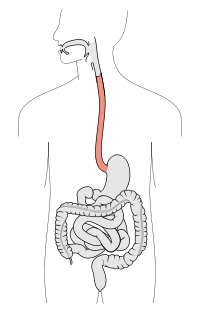
Photo from wikipedia
Head and neck cancer (HNC) guidelines recommend regular multidisciplinary team (MDT) monitoring and early intervention to optimize dysphagia outcomes; however, many factors affect the ability to achieve these goals. The… Click to show full abstract
Head and neck cancer (HNC) guidelines recommend regular multidisciplinary team (MDT) monitoring and early intervention to optimize dysphagia outcomes; however, many factors affect the ability to achieve these goals. The aims of this study were to explore the barriers/facilitators to establishing and sustaining a MDT HNC care pathway and to examine the dysphagia-related speech-language pathology (SLP) and dietetic components of the pathway. Using the Consolidated Framework for Implementation Research (CFIR), a mixed methods study design was used to evaluate an established MDT HNC pathway. Ten MDT members provided perceptions of facilitators/barriers to implementing and sustaining the pathway. Patients attending the SLP and dietetic components of the pathway who commenced treatment between 2013 and 2014 (n = 63) were audited for attendance, outcome data collected per visit, and swallowing outcomes to 24-month post-treatment. Dysphagia outcomes were compared to a published cohort who had received intensive prophylactic dysphagia management. Multiple CFIR constructs were identified as critical to implementing and sustaining the pathway. Complexity was a barrier. Patient attendance was excellent during treatment, with low rates of non-compliance (< 15%) to 24 months. Collection of clinician/patient outcome tools was good during treatment, but lower post-treatment. Dysphagia outcomes were good and comparable to prior published data. The pathway provided patients with access to regular supportive care and provided staff opportunities to provide early and ongoing dysphagia monitoring and management. However, implementing and sustaining a HNC pathway is complex, requiring significant staff resources, financial investment, and perseverance. Regular audits are necessary to monitor the quality of the pathway.
Journal Title: Dysphagia
Year Published: 2018
Link to full text (if available)
Share on Social Media: Sign Up to like & get
recommendations!